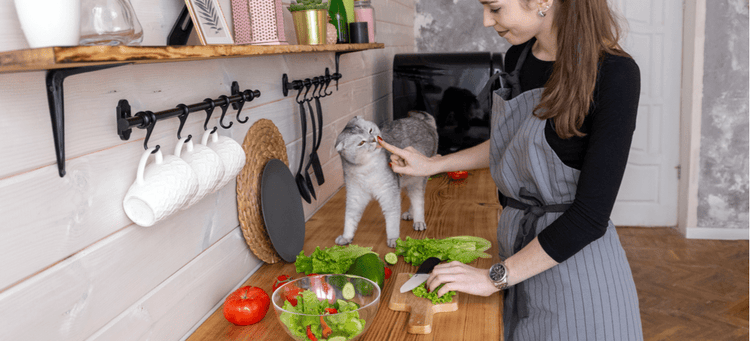
Home-Cooked Diets for Cats and Dogs
Wondering if a home-cooked diet is right for your pet? Here are answers to common questions about the safety and nutritional value of homemade meals for cats and dogs.
How Can a Home-Cooked Diet Benefit My Pet?
A veterinarian will recommend a home-cooked diet for a pet unwilling to consume a commercial diet or in need of increased calorie intake or nutritional support in relation to management of disease processes. Some diseases that may benefit from a home-cooked diet include chronic kidney disease, diabetes mellitus, or gastrointestinal disease. Pet owners will also have additional control over ingredient selection, sourcing, and preparation. Home-cooked diets in general tend to be highly digestible, which can reduce stool volume depending on ingredient selection.
Are There Any Hazards Related to Preparing My Pet’s Meals at Home?
Many home-cooked diets found online, in books, and in magazines are incomplete and unbalanced. This means that they do not provide all of the essential nutrients your pet needs. Studies evaluating the nutritional adequacy of both cat and dog diets for adult maintenance from various sources (including those written by veterinarians) found that most of these diets did not meet all essential nutrient requirements. An imbalanced diet can lead to nutrient deficiencies over time.
Pet owners may also find recipes online for various disease states. Pets with diseases may be more vulnerable to nutrient deficiencies than a healthy animal. A study evaluating home-cooked diets for both cats and dogs with chronic kidney disease found that, along with numerous mineral deficiencies, 77% of recipes for dogs and 43% of recipes for cats were inadequate in protein or deficient in at least one amino acid. This can lead to loss of muscle and far worse for these vulnerable patients. Another study found that 0 of 27 recipes for dogs with cancer met all essential nutritional requirements.
Puppies and kittens are generally more susceptible to nutrient deficiencies due to their rapid rate of growth. Nutritional deficiencies, primarily bone abnormalities, can develop easily on an unbalanced diet and have been reported in both dogs and cats.
What Nutrients Are Required in a Balanced, Home-Cooked Diet?
A home-cooked diet needs to be properly formulated and prepared. Essential nutrients include protein, essential fatty acids, minerals, trace minerals, and vitamins. Although carbohydrates are not required in the diet of a dog or cat, carbohydrate ingredients can provide dietary fiber and small amounts of essential nutrients, as well as serve as a source of energy. Dietary fiber can also be useful in optimizing stool quality and gastrointestinal health. Cats, as true carnivores, require an animal-based protein source, supplemental taurine, and animal-based fat to provide arachidonic acid.
How Can I Tell If My Home-Cooked Diet Is Incomplete or Imbalanced?
Ingredient quantities should be specific and include both weight (grams or ounces) and common measurements where appropriate (for example – 4.9 ounces (1 cup of chopped or diced) boneless, skinless, boiled chicken breast). Descriptions of ingredients should not be vague (e.g. chicken or beef), but should contain descriptions of types of cuts and/or fat percentages (for example – chicken thigh without bone or skin, or 85% ground beef). The recipe should indicate if the ingredient should be measured prior to or following cooking.
Many dog or cat vitamin and mineral supplements are inadequate to balance a home-prepared diet, as they are meant to be supplemented on top of an already complete and balanced diet. Human vitamin and mineral supplements have varying formulations that often change. Some formulations of human multivitamin/multimineral supplements may be harmful to companion animals (for example – poorly bioavailable forms of copper, high vitamin D levels, etc.), therefore, human supplements should only be used if recommended by your veterinarian.
How Do I Ensure That My Home-Cooked Diet Is Nutritionally Complete and Balanced?
If you are home cooking for your pet, have your vet review all recipes before serving. Please be sure to mention all supplements in addition to medications you are administering as well. A consultation with a Board Certified Veterinary Nutritionist® can help determine if a home-prepared diet is appropriate for your pet. They can also evaluate your pet’s health, diet, and medical history to make individualized recommendations to ensure your pet is receiving the best diet.